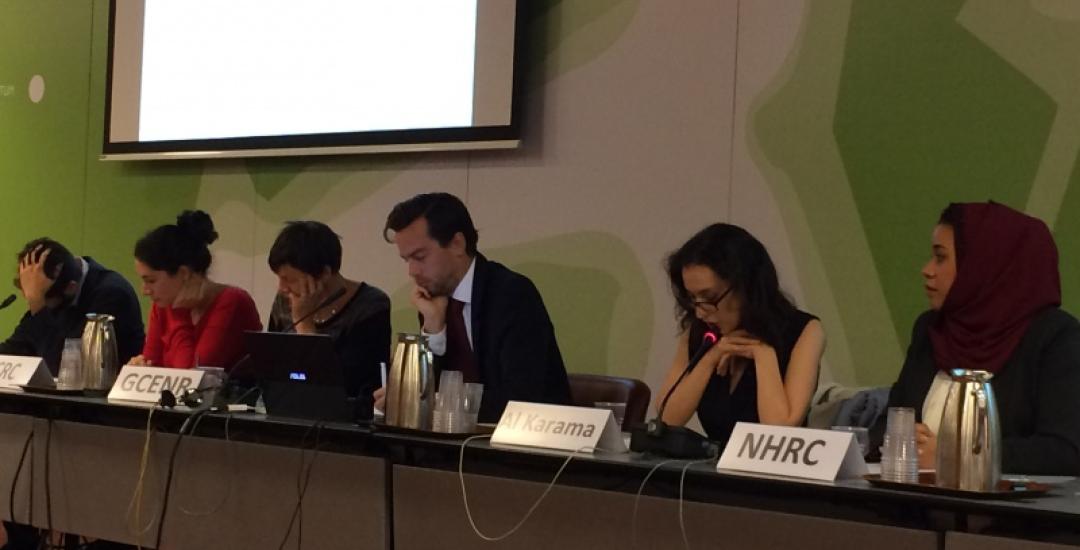
On 9 October 2015, UPR Info held the pre-session meeting on Oman in view of the State's second review under the United Nations Universal Periodic Review (UPR), which will take place during the UPR's 23rd session in November. During the pre-session, Alkarama, together with Child Rights Connect (CRC), Global Campaign for Equal Nationality Rights (GCENR) and Human Rights Watch (HRW), as well as the National Human Rights Commission of Oman (NHRC) − the Omani national human rights institution − expressed their concerns regarding the human rights situation in Oman to several delegations of UN member States, which will make recommendations to Oman during its review. The main issues raised by Alkarama focused on reprisals against political activists and human rights defenders, excessive use of force against protesters, criminalisation of freedom of expression and the Nationality Code.
Alkarama also referred to more recent developments such as the arrest and incommunicado detentions of several activists in August 2015 and the confiscation of their passports, as well as the ban imposed on candidacies of individuals who participated to peaceful demonstrations during the Shura Council Elections of September 2015. Alkarama also reiterated these concerns before the delegations of the European Union State members on 15 October 2015.
Violations committed against peaceful dissidents, human rights defenders and journalists
"Alkarama has documented cases of extrajudicial killings, arbitrary detentions, enforced disappearance and torture committed against peaceful demonstrators, human rights activists, journalists and bloggers who publicly criticise government policies," explained Radidja Nemar, Legal Officer for the Gulf at Alkarama, during the pre-session. In particular, Radidja Nemar highlighted the case of parliamentarian Talib Al Ma'amari, who will receive Alkarama's 2015 Award for Human Rights Defenders in the Arab World, in recognition for his significant work defending human rights in the country. Al Ma'amari was arrested in October 2013 for participating in peaceful demonstrations against the pollution of petrochemical industries in Liwa and remains in prison, despite an Opinion issued in November 2014 by the UN Working Group on Arbitrary Detention (WGAD) requesting his immediate release.
Along with Alkarama, HRW reported that since 2011, police and security forces have been using tear gas, rubber bullets and live ammunition to disperse protesters, practices which have resulted in several deaths and injuries. Radidja Nemar complemented by stating that "secret and incommunicado detentions are systematically practiced by the Special Forces of the Royal Omani Police against protesters, dissidents and journalists. During this detention, victims are being extensively questioned and mistreated." To date, authorities have not held any officials accountable for their excessive use of force or ill-treatment of protesters.
Limitations of fundamental rights and freedoms enshrined in Omani laws
Another issue raised by Alkarama was the limitations in Omani law on fundamental rights and freedoms, especially the freedom of peaceful assembly and association as well as freedom of opinion and expression. As expressed by the UN Special Rapporteur on the rights to freedom of peaceful assembly and of association (SR FPAA), Maina Kiai, on his return from a visit to Oman from 8 to 13 September 2014, the Omani Penal Code in fact criminalises "actions of libelling or expressing public criticism of the Sultan, committing an affront to an official in service 'publicly by publication and by speech or gestures' and blaspheming or 'pronounc[ing] a curse at his Prophets'", as well as "actions of disturbing 'public tranquillity by screaming or making noise, with no reason, or by using any noisy device... in public or in private places'." These provisions not only impose severe restrictions to freedom of expression, but are also used to silence dissenting voices.
The issue of the Nationality Code as a tool for discrimination and reprisals
Finally, the organisations expressed their deep concern over the Omani Nationality Code, which discriminates against Omani women married to non-Omani men, limiting their right to pass on their nationality to their children. Furthermore, Alkarama pointed out that since a 2014 amendment, the Code provides for the forfeiture of Omani nationality of any citizen who harms the State's image abroad, including through collaboration with "international organisations," which can be used to punish human rights defenders working internationally.
In view of the current situation of human rights in Oman, Alkarama calls on the UN delegations to make, inter alia, the following recommendations to Oman:
- Ratify the International Covenant on Civil and Political Rights (ICCPR) and the Convention Against Torture (CAT);
- Ensure freedom of opinion and expression in accordance with international standards and decriminalise free expression and peaceful protest against the government; and
- End reprisals against human rights defenders and peaceful activists and release all those detained for participating in peaceful activities.
For more information or an interview, please contact the media team at media@alkarama.org (Dir: +41 22 734 1007 Ext: 810)
